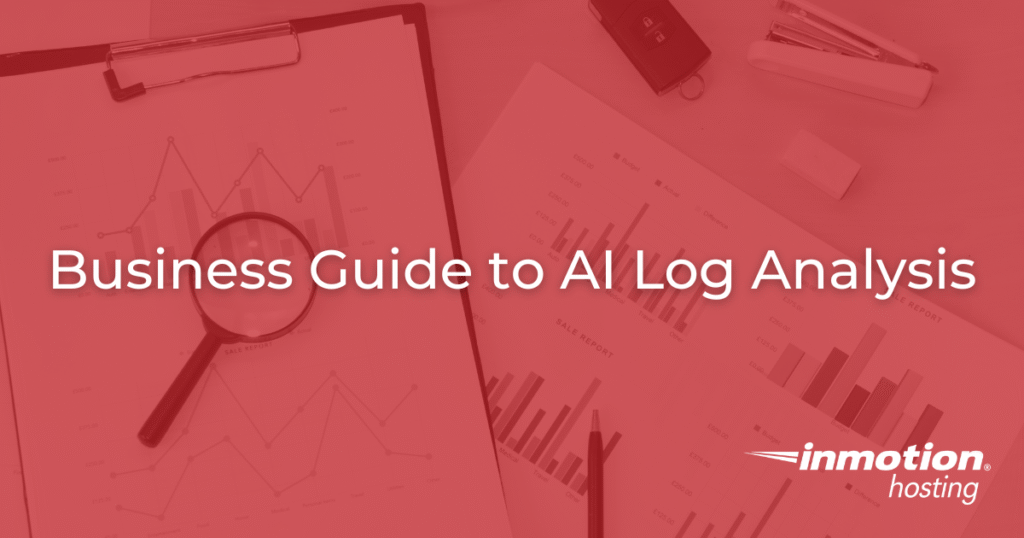AI log analysis is changing how online businesses manage hosting performance and security. Instead of manually combing through technical logs, AI tools detect anomalies, predict risks, and translate data into actionable insights that marketers and founders can use. From spotting plugin conflicts to flagging security threats, AI makes uptime more predictable and troubleshooting faster.
When you run a business online, every second of uptime matters. From high-traffic campaigns to scaling an eCommerce site, your digital presence depends on speed, and more importantly, visibility into how your systems behave.
Server and application logs hold the answers, but for many marketers and founders, reading logs can feel like trying to decode another language. This is where AI log analysis comes in.
AI-powered log analysis tools transform raw data into actionable insights in seconds, bridging the gap between technical logs and business outcomes. They help you automatically detect problems, identify performance bottlenecks, and even predict risks before they impact your customers. For anyone running a digital brand, this is the difference between reactive troubleshooting and proactive performance management.
In this article, you’ll learn what AI log analysis is, why it matters, which tools are leading the space, and how it fits into InMotion Hosting’s mission of being the hosting partner behind ambitious brands.
Let’s begin with the basics.
What Is Log Analysis
Log analysis is the process of reviewing and interpreting the records (called logs) that software, servers, and devices automatically generate. These logs track every event that occurs within a system. By analyzing them, you can identify problems, understand performance, and make better decisions about maintenance and security.
In short, log analysis is like reading a diary your system keeps to understand what’s working, what’s not, and how to improve it.

Manually parsing these logs requires technical expertise and can take hours. AI log analysis changes the equation by using machine learning to detect patterns, spot anomalies, and summarize findings in plain language. This reduces the time it takes to uncover root causes of problems while offering clarity for non-technical decision-makers.
Understanding the mechanics of AI log analysis helps illustrate why it’s becoming such a powerful tool in hosting. Let’s explore how the technology works at a deeper level.
Technical Sidebar: How AI Detects Anomalies
AI models analyze historical log data and learn what “normal” behavior looks like for your server. When something deviates, like a sudden spike in 404 errors, repeated failed login attempts, or memory usage creeping beyond expected ranges, the AI flags it. Unlike manual monitoring, AI can sift through millions of log entries in seconds, drastically reducing response times.
This technical foundation matters because it highlights the speed and precision that AI tools bring to monitoring. Next, we’ll focus on why this capability is especially valuable for marketers and founders who often struggle with log interpretation.
Why AI Log Analysis Matters for Marketers and Founders
For many of our core readers, logs often become a point of frustration. You might see a cryptic error message like 502 Bad Gateway or 504 Timeout and have no idea what it means. AI log analysis bridges that gap by providing clear insights without forcing you to become a sysadmin overnight.
From scanning community forums like Reddit and Stack Overflow, the biggest frustrations often include unclear error messages, slow root-cause analysis, and the overwhelming volume of data. These pain points can stall campaigns, harm customer trust, and increase operational costs. AI log analysis provides plain-language summaries, real-time alerts, and predictive analytics to keep downtime at bay.
By solving these challenges, AI log analysis creates a smoother path for ambitious businesses to focus on growth instead of troubleshooting.
The Best AI Log Analysis Tools
We’ve reviewed the top third-party options. Each tool offers unique strengths, from ease of use to deep technical customization. The right choice depends on your business’s scale, technical resources, and budget.
1. Datadog
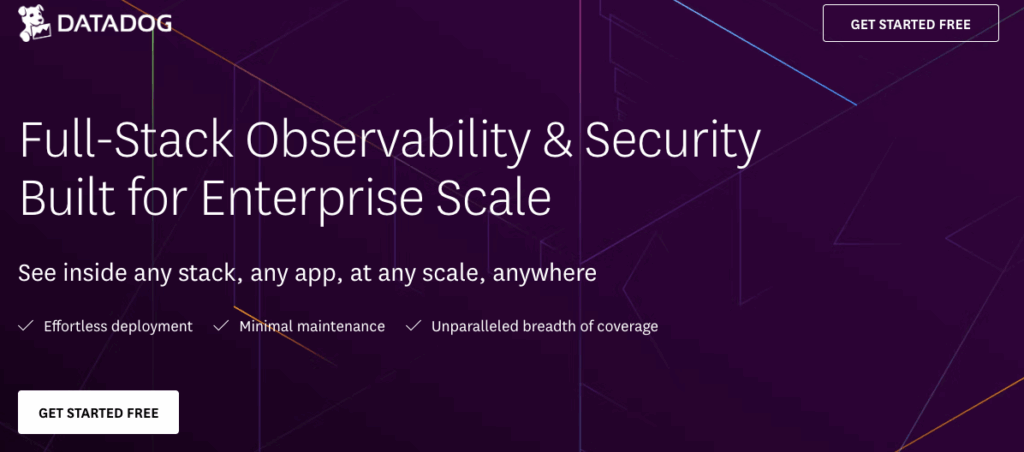
Datadog is a popular choice for cloud-native monitoring. It integrates easily with applications and servers, making it appealing for small teams that need quick visibility. Its AI-driven features include anomaly detection and intelligent alerting that help businesses catch problems before they grow.
Pro: Easy integration with a wide range of applications and beginner-friendly dashboards.
Con: Costs can rise quickly as data ingestion increases.
2. Splunk
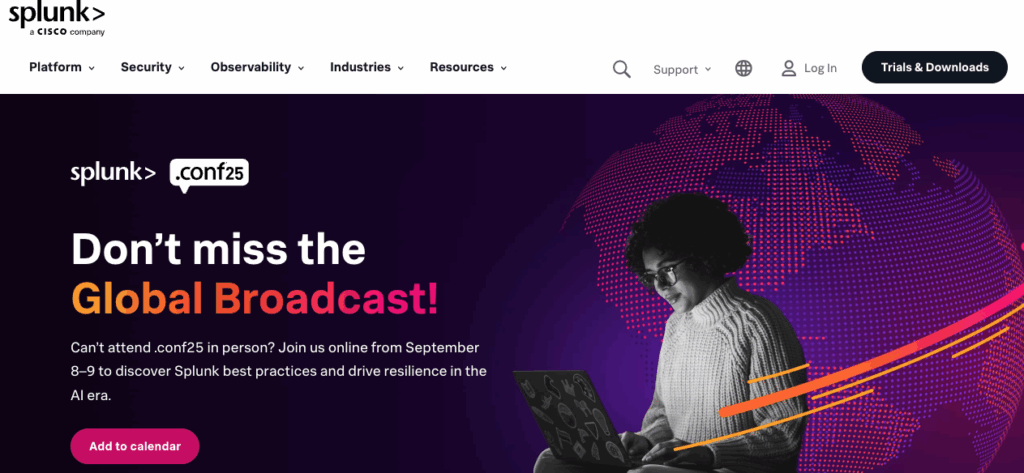
Splunk is often the go-to for enterprise-level log analysis. Its AI-driven search, visualization, and predictive features provide incredible depth. Splunk can handle vast amounts of data, which is why large organizations trust it for mission-critical monitoring.
Pro: Powerful AI features and predictive analytics suitable for enterprise needs.
Con: High cost and steep learning curve, making it less ideal for small businesses.
3. ELK Stack (Elasticsearch, Logstash, Kibana) with ML Add-ons
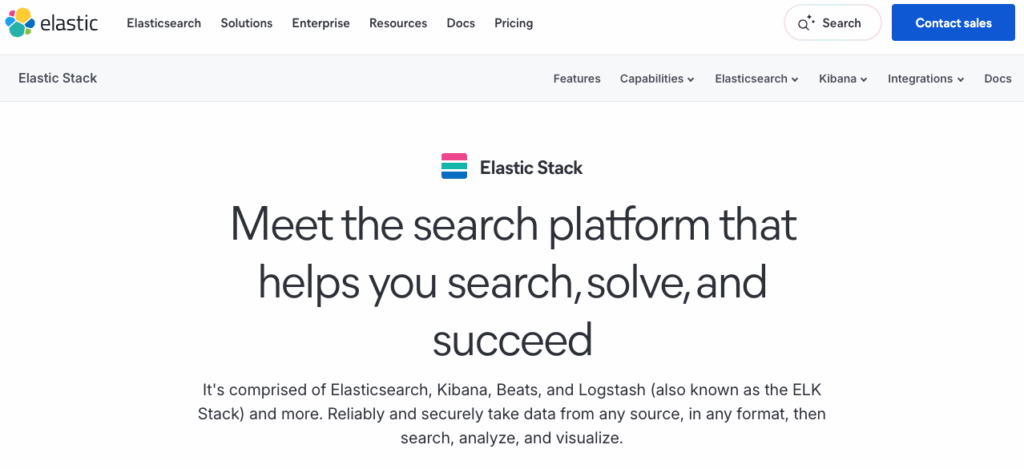
The ELK Stack is a favorite among developers because it is open source and highly customizable. With machine learning add-ons, it becomes a capable AI log analysis tool. Businesses can build tailored dashboards, automate alerts, and use ML to detect unusual activity.
Pro: Highly customizable and open-source, giving businesses full control.
Con: Complex setup and management require technical expertise.
4. New Relic
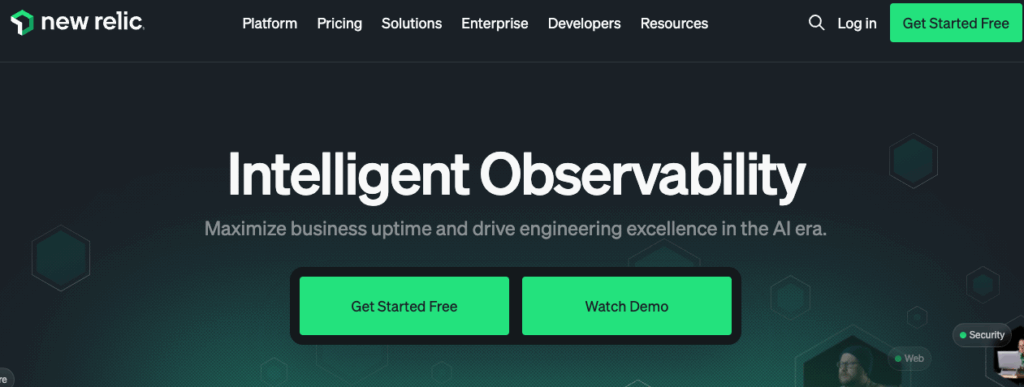
New Relic offers cloud-native log analysis with AI-powered incident correlation. It is designed to provide insights not just from logs, but from across the entire application stack. This makes it valuable for businesses with dynamic, multi-layered infrastructures.
Pro: Flexible pricing and easy-to-use dashboards for quick adoption.
Con: Advanced features require additional learning and can increase costs at scale.
5. Sumo Logic

Sumo Logic provides continuous intelligence through cloud-based log management and monitoring. It features AI-powered analytics designed to spot performance bottlenecks and security threats. With real-time dashboards, it’s built for businesses that need constant visibility.
Pro: Simple setup with real-time dashboards for fast insights.
Con: Pricing fluctuates with data spikes, making budgeting harder.
6. Graylog
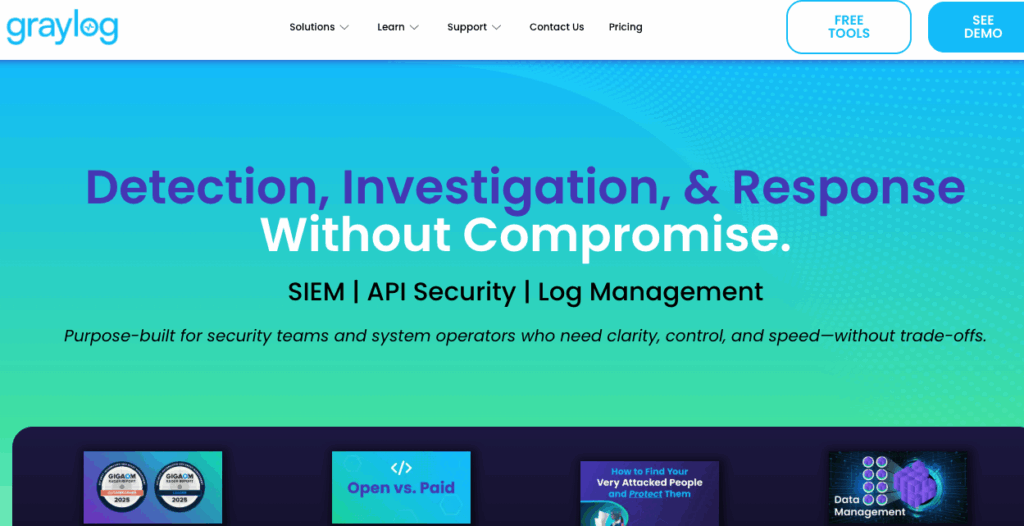
Graylog is another open-source solution known for flexibility and scalability. It integrates machine learning through plugins, allowing for anomaly detection and predictive alerts. Graylog appeals to businesses that want control without being locked into high licensing costs.
Pro: Open-source flexibility with strong scalability potential.
Con: Requires significant technical knowledge for setup and ongoing use.
7. Loggly (by SolarWinds)
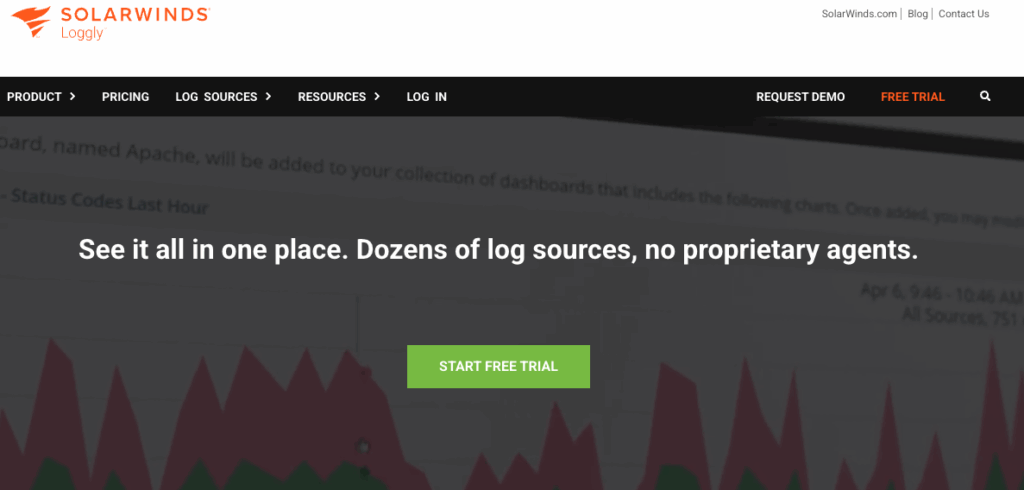
Loggly focuses on simplicity, with a cloud-first approach. Its AI features include smart parsing and anomaly detection, making it useful for smaller teams. With lightweight setup and user-friendly dashboards, it’s particularly appealing to non-technical users.
Pro: Affordable and beginner-friendly, with clear dashboards.
Con: Limited customization compared to more advanced enterprise tools.
Expanded Comparison Chart
By comparing these tools, businesses can choose the solution that best balances their needs, budget, and technical capacity. With the tools established, let’s turn to how these solutions apply in everyday scenarios.
Real-World Use Cases
AI log analysis isn’t just theory; it solves real hosting problems every day. For marketers and founders, these scenarios often make the biggest difference. For example, WordPress plugin conflicts generate repeated PHP errors that AI can flag in seconds. Instead of hours of trial and error, you’re guided directly to the issue.
Another common use case is brute-force attack detection, where repeated failed logins trigger alerts long before an account is compromised. Similarly, AI highlights slow database queries or scaling challenges, giving businesses the chance to adjust resources proactively.
Understanding these cases shows how AI moves beyond buzzwords into practical, revenue-protecting solutions. To deepen this, we’ll explore a technical callout that demonstrates its value for Node.js applications.
Technical Callout: Log Analysis for Node.js Apps
Node.js applications often generate detailed runtime logs. AI analysis can identify memory leaks by tracking error repetition patterns, detect slow event loop performance through monitoring timeouts, and highlight unusual request patterns that could indicate denial-of-service attacks.
For founders building applications, this level of visibility is critical. It means you can launch new features with confidence, knowing your logs will warn you of hidden stability risks. Developers, in particular, gain an early warning system that helps avoid costly downtime.
With the technical perspective established, let’s step back and recognize the pitfalls of AI log analysis to ensure businesses adopt it wisely.
Common Pitfalls of AI Log Analysis
While powerful, AI log analysis isn’t flawless. One risk is over-reliance on automation. AI should guide decisions, not replace human oversight. False positives also remain a challenge. AI might flag harmless spikes as threats, creating unnecessary alarm.
Another concern is data privacy. Logs can contain sensitive information, so businesses must ensure tools are configured with secure practices. Lastly, costs can escalate as data volumes increase, which may surprise smaller teams.
Acknowledging these pitfalls sets realistic expectations and helps businesses balance automation with oversight. With this context, we can now compare AI log analysis against traditional monitoring approaches.
AI vs Traditional Log Monitoring
Traditional log monitoring often relies on manual reviews or basic alerting systems. These methods can be slow, error-prone, and reactive. AI log analysis changes the dynamic by making monitoring faster, smarter, and predictive.
For example, AI-driven solutions can parse millions of entries in seconds while providing plain-language summaries that non-technical teams can understand. This accessibility makes them especially valuable for marketers and founders who need quick answers without the complexity.
Comparing the two highlights why businesses are increasingly shifting toward AI-assisted solutions. It demonstrates the leap from reactive troubleshooting to proactive performance management.
Now that we’ve compared approaches, let’s wrap up with how AI log analysis complements InMotion Hosting’s infrastructure and support.
Conclusion
AI log analysis transforms how businesses manage uptime, performance, and security. For marketers and founders, it provides clarity in moments of crisis and confidence when scaling. By combining AI-powered insights with InMotion Hosting’s infrastructure, VPS resources, and real human support, you can have a hosting experience that’s not just reactive, but predictive.
This means fewer late-night troubleshooting sessions, smoother customer experiences, and a foundation for growth without limits. Our hosting services are engineered to integrate seamlessly with the best AI tools in the market.
As you consider your next steps, think of AI log analysis as an extension of your hosting strategy. It ensures your site not only runs fast and securely but also evolves with you. That’s the kind of accountability and partnership you can trust with InMotion Hosting.

